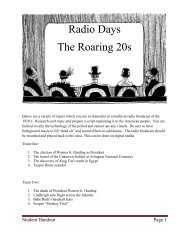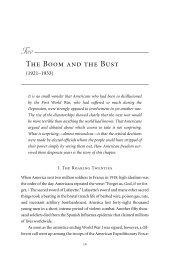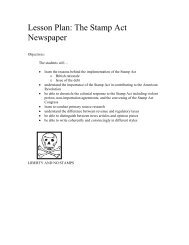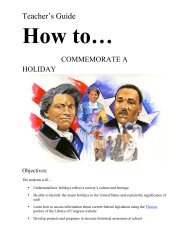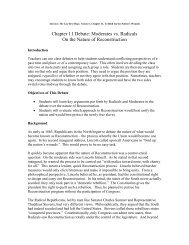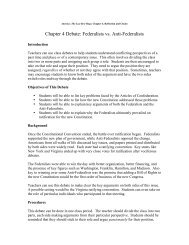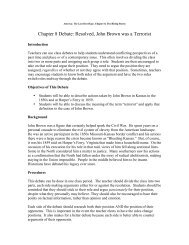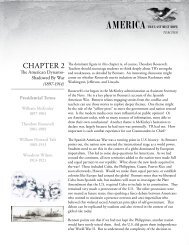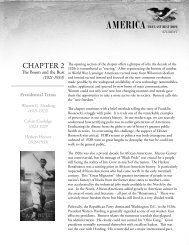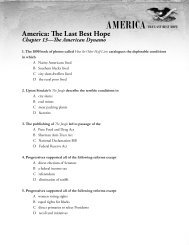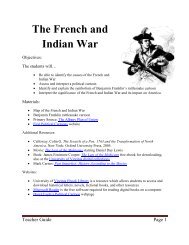Chapter 3 Teacher Summary - Last Best Hope
Chapter 3 Teacher Summary - Last Best Hope
Chapter 3 Teacher Summary - Last Best Hope
You also want an ePaper? Increase the reach of your titles
YUMPU automatically turns print PDFs into web optimized ePapers that Google loves.
AMERICA: THE LAST BEST HOPETEACHERfor starting the war. Wilson also agreed to the French Guarantee Treaty,putting the U.S. on record that it would join Britain in protecting France ifit were attacked by Germany. He acquiesced on a number of these issues inorder to not give up the point he considered essential if The Great War wasindeed going to be the “war to end all wars.” That was his point numberfourteen – the creation of a League of Nations to ensure world peace.Classes can analyze the peace treaty by seeing how it did and did not reflecteach of Wilson’s Fourteen Points. They should also compare the map ofEurope before and after the war.Photo 2: The Hall of Mirrors inVersailles. (NARA)Germany grudgingly signed the Treaty of Versailles in 1919, but its harshterms would engender great bitterness in Germany over the coming yearsand accusations that those who had signed the armistice leading to thetreaty were guilty of a “stab in the back.” These charges would crippled thedemocratic Weimar Republic in Germany and enable a disenchanted veterannamed Adolf Hitler to use this anger to launch a political movement andeventually scrap the treaty altogether.Wilson returned home convinced the American people would support“his” treaty. But, the Constitution gives the United States Senate the roleof “advice and consent” in such matters. Two thirds of the Senate wouldhave to ratify the treaty to see it take effect. Republican Henry CabotLodge led opposition in the Senate. Some senators were “Reservationists”who would vote for ratification if certain changes were made. Of particularconcern was Article X of the League of Nations Covenant. It required thateach League member guarantee the “territorial integrity” of every otherLeague member. It seemed clear that this would commit America to warswithout a declaration by the United States Congress. Other senators were“Irreconcilables” who would not support the treaty under any circumstances.Perhaps Wilson believed he had compromised enough in Paris, for he wasabsolutely unwilling to compromise on the treaty with the U.S. Senate.His attempt to appeal directly to the people on a national speaking tourresulted in his total exhaustion and eventual stroke. Then disabled, Wilsonbecame even more unwilling to consider any changes to the document, thusensuring its defeat in the Senate. He also refused to even submit the FrenchGuarantee Treaty for consideration. Thus, the U.S. never did sign the Treatyof Versailles and never joined the League of Nations. After Wilson left officein the 1920s, the United States signed separate peace treaties with each ofthe Central Powers. <strong>Teacher</strong>s and students can discuss the clash betweenidealism and the necessity of compromise in politics and particularly in ademocracy. Wilson deeply believed in his principles. Should he be admiredfor not giving in? Or is it simply the case that such idealists do not make
AMERICA: THE LAST BEST HOPETEACHEReffective politicians? If that is true, what does that say about the politicalprocess in a democracy?



